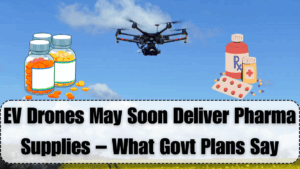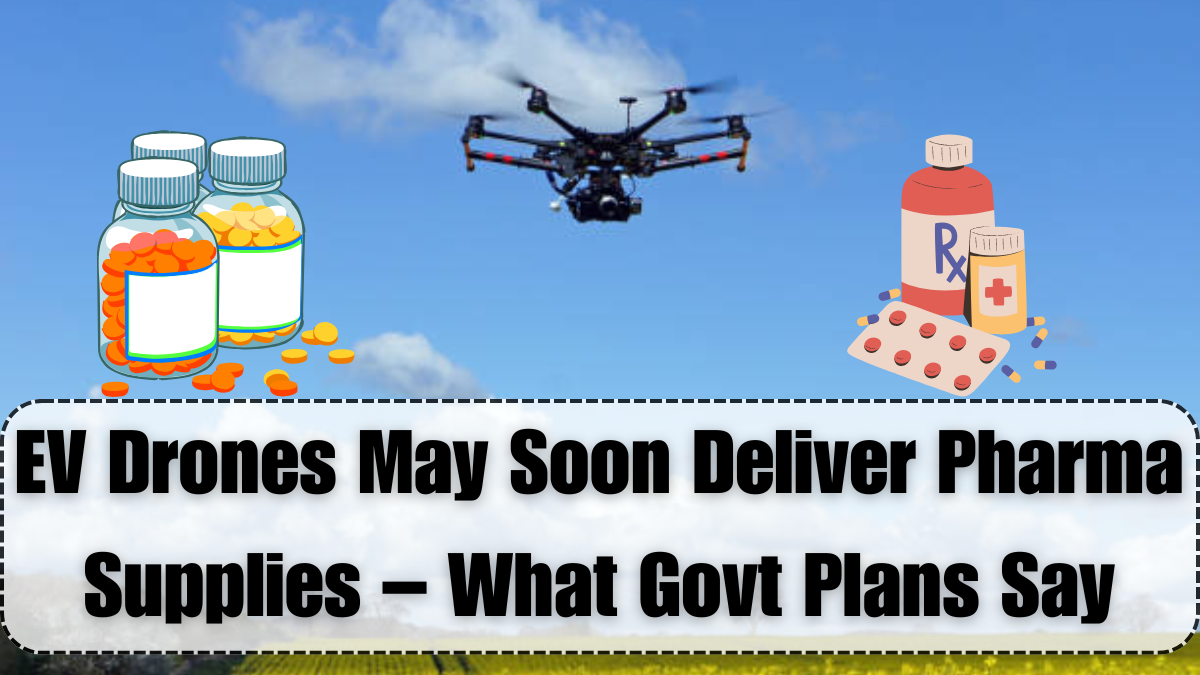Pharma drone regulations in India are rapidly evolving as the use of electric-powered drones for medical delivery becomes a practical reality. Across various states, government bodies are actively working on frameworks to ensure safe, compliant, and efficient operation of drone EVs for transporting sensitive pharmaceutical supplies such as vaccines, blood units, medicines, and diagnostic samples.
This growing shift towards pharma air delivery is part of India’s broader focus on modernizing healthcare logistics. The use of electric drones has already been tested in multiple pilot programs, with state governments and private health tech firms showing successful outcomes in rural and remote areas. To support this innovation, India’s Directorate General of Civil Aviation (DGCA) and Ministry of Civil Aviation are formalizing a detailed policy covering flight zones, altitude restrictions, drone types, and pharmaceutical payload handling.

What the Current Drone EV Guidelines Cover
The present guidelines for pharma drone regulations include provisions from India’s Unmanned Aircraft System (UAS) Rules, 2021. However, with pharmaceutical applications expanding quickly, sector-specific norms are being refined. The policies ensure that all operations follow strict safety and airspace management practices.
Key provisions in place or under development include:
-
Permission-based flying in Green Zones for pharma air delivery
-
Drone registration on the Digital Sky platform
-
Mandatory Remote Pilot Licenses for operators
-
Payload weight limitations (usually up to 5–10 kg)
-
Specific corridor-based operations for medical emergency drones
These regulations aim to enable large-scale use of drone EVs without compromising public safety or airspace security.
Use Cases for EV Drones in Pharma Delivery
Drone EVs are proving extremely valuable in regions with difficult terrain, traffic congestion, or inadequate healthcare infrastructure. They enable ultra-fast delivery of critical supplies during emergencies, disease outbreaks, or in regions prone to natural disasters.
Major use cases include:
-
Vaccine delivery to tribal and hilly areas
-
Transportation of blood samples and test kits from remote clinics to labs
-
Delivery of insulin, asthma medication, or anti-venom in emergencies
-
Urban delivery of medicines during peak traffic hours
-
Disaster relief zones where ground transport is inaccessible
These use cases have been piloted in Telangana, Maharashtra, and North-Eastern states with active support from the central and state governments.
Drone EV Hardware & Safety Measures
Modern pharma air delivery drones come equipped with temperature-controlled boxes, anti-tamper locks, GPS trackers, and real-time communication systems. Most use electric propulsion for noise-free, eco-friendly operation. Safety remains paramount, and developers are working closely with regulators to meet national security and air traffic protocols.
Highlights of safety mechanisms in drone EVs:
-
Autonomous Return-to-Home (RTH) technology
-
Real-time environmental sensors
-
Encrypted data channels for secure GPS transmission
-
Controlled altitude and geo-fencing to avoid restricted areas
-
Emergency parachutes or auto-land systems in case of failure
All these features align with the upcoming pharma drone regulations to make drone-based medicine delivery mainstream and secure.
FAQs
What are pharma drone regulations in India?
They are evolving rules issued by DGCA and MoCA to govern the use of drone EVs for pharmaceutical and medical deliveries.
Is drone-based pharma delivery allowed everywhere?
Currently, it’s permitted in designated Green Zones with prior approvals. Wider deployment depends on finalized pharma drone regulations.
What kind of payload can EV drones carry for medicine?
Most approved drones can carry up to 5–10 kg of pharma products such as medicines, vaccines, or test kits under controlled conditions.
Are these drones temperature-controlled?
Yes, pharma air delivery drones are equipped with thermal containers and sensors to maintain ideal temperature for sensitive medical items.
Has India already used drones for medical deliveries?
Yes, several successful trials have been conducted in Telangana, Meghalaya, and Arunachal Pradesh using drone EVs for rural healthcare delivery.
Click here to know more.
